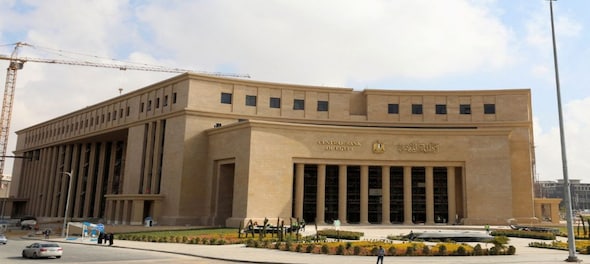
Egypt devalued its currency, allowing it to weaken around 35%, following a massive interest-rate hike by a country embroiled in its worst economic crisis in decades.
The pound plunged to 48.18 per dollar as of 12 pm in Cairo on Wednesday, having traded at about 30.9 for the past year. It moved minutes after the central bank raised rates at an unscheduled meeting and said it will allow the market to determine the exchange rate.
The move raised the key rate by 600 basis points to 27.25%, according to a statement by the central bank, which also said that unifying the nation’s exchange rates is “crucial.” The decision likely paves the way for an agreement with the International Monetary Fund on increasing Egypt’s current $3 billion loan to more than $10 billion, including funds from other partners.
A new devaluation became possible after Cairo struck a $35 billion deal late last month with the United Arab Emirates to develop parts of Egypt’s Mediterranean coast and elsewhere. Authorities described it as the biggest investment commitment ever secured by Egypt and the scale of it took investors by surprise.
Egypt’s dollar bonds rallied significantly after Tuesday’s decisions. Government debt due in 2047 led the advance, gaining 4 cents on the dollar to around 82 cents.
“We’ll have to wait to see where it settles,” said Farouk Soussa, an economist at Goldman Sachs Group Inc., referring to the currency. “We expect 45-50. The big surprise of the day was the mega hike, which over delivered and has boosted confidence in the market.”
The devaluation brought the pound to a level around its value on the black market. The IMF has encouraged Egypt to tighten monetary policy to counter inflation of almost 30% and adopt a more flexible official exchange rate.
The central bank’s Monetary Policy Committee said it had “decided to accelerate the monetary tightening process in order to fast-track the disinflation path and ensure a decline in underlying inflation.”
The Muslim holy month of Ramadan, set to begin on Sunday, posed an informal deadline for authorities to implement a devaluation. It’s a period of big family gatherings and expansive evening meals, and authorities were unlikely to wait until then to hand Egyptians a sudden price shock.
What Bloomberg Economics says
“The arrival of the UAE bailout has unlocked the policy chain reaction in Egypt. The central bank has lifted interest rates. Authorities have floated the currency, and the gap with the black market should close. What’s next? A deal with the IMF is likely in the next few hours.”
Egypt’s bond spreads over US Treasury yields narrowed, according to indicative quotes from JPMorgan Chase & Co. indexes. They fell to 43 basis points to 529, the data showed.
Egypt’s benchmark EGX30 stock index gained as much as 4.5% to a record, led by gains in Commercial International Bank. Lenders stand to benefit from higher interest rates.
Exporters like Abou Kir Fertilizers & Chemical Industries Co., which benefit from a weak domestic currency, were also among the stocks rising the most.
The IMF has delayed two reviews of Egypt’s existing program after the country appeared to fall short on promises to allow what the central bank called a “durably flexible” exchange-rate regime. Previous bouts of depreciation — in March 2022, October 2022 and January 2023 — were followed by long stretches of stability.
The IMF is keen to protect the $400 billion economy that’s vulnerable after growing reliant on substantial foreign-exchange inflows from both tourism and Suez Canal fees.
The waterway—a critical source of income usually amounting to billions of dollars a year — could be threatened by attacks in the Red Sea that are causing many shipping firms to stop using the canal.
“It cannot be ruled out that in the short-term the exchange rate will overshoot, it might take a few days or weeks for the exchange rate to stabilize around its new equilibrium level,” said Gergely Urmossy, emerging markets strategist at Societe Generale SA. If the central bank “transitions away from the hard peg, Egypt’s outlook will improve not only cyclically but also structurally,” he said.
Check out our in-depth Market Coverage, Business News & get real-time Stock Market Updates on CNBC-TV18. Also, Watch our channels CNBC-TV18, CNBC Awaaz and CNBC Bajar Live on-the-go!


Lok Sabha Election: Re-elections at a Ajmer booth after presiding officer misplaces register of voters
May 2, 2024 4:54 PM
Rahul will be forced to take out 'Congress Dhoondho Yatra' after June 4: Amit Shah in Bareilly
May 2, 2024 4:36 PM

